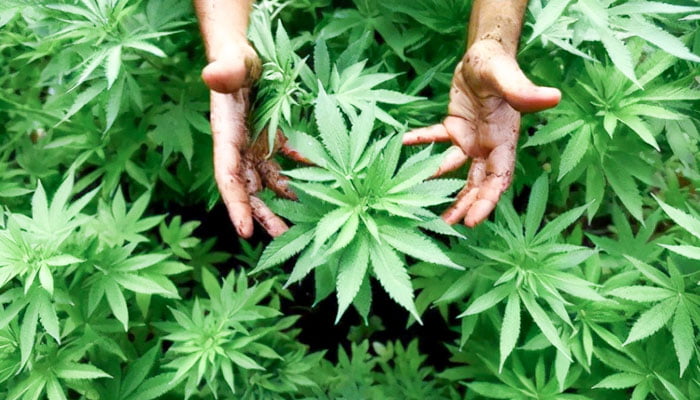What Is Huo Ma Ren
Huo Ma Ren also known as Semen Cannabis, Fructus Cannabis, or Hemp Seeds is the mature seed of Cannabis sativa, which is an annual herb belonging to the family Moraceae. It is a relatively practical and common Chinese herbal medicine, which first appeared in <Shennong Ben Cao Jing> in the late Western Han Dynasty (around 100 BCE).
Cannabis sativa is a short-day flowering plant. It is native to India, Iran, the Himalayas to Siberia and China, and is now widely cultivated all over the world.
This plant is used in various forms for life, medicine, religion, etiquette, and entertainment. Its fibers can be made into paper, linen, fishing nets, biodegradable plastics, building materials, animal feed, and fuel.

According to the content of tetrahydrocannabinol in Cannabis sativa, some countries in Europe and America classify cannabis into medicinal cannabis or industrial cannabis. Industrial cannabis contains trace amounts of tetrahydrocannabinol, which is generally permitted as a legitimate economic crop. Cannabis sativa with high tetrahydrocannabinol content is defined as a drug in some countries.
In the fall of each year, people collect the mature fruits of Cannabis sativa, crush them slightly, take out their seeds, dry them in the sun, and make them into Chinese herbal medicines.
Huo Ma Ren is rich in fatty oils, such as linoleic acid, α-linolenic acid, oleic acid, palmitoleic acid, eicosadienoic acid, arachidic acid, stearic acid, palmitic acid, lignoceric acid, behenic acid, methyl linolenic acid, methyl oleate, methyl stearate, and methyl palmitate.
Besides, it also contains cannflavin A, cannflavin B, cannflavin C, chrysoeriol, 6-prenylapigenin, rutin, cannabsin A, choline, trigonelline, scoparone, umbelliferone, oleanene, oleanolic acid, stigmasterol, β-sitosterol, β-daucosterol, edestin, tetrahydrocannabinol, emulsin, amethionine, Cystine, vanillin, mannitol, and n-tetracosane.
According to <Shennong Ben Cao Jing>, the medicinal nature of Huo Ma Ren is relatively neutral, with a sweet taste. It has a certain therapeutic effect on the pathological changes of the spleen, stomach, and large intestine meridians.
In traditional Chinese medicine, it is often used to moisten intestines and relieve constipation, nourish yin and supplement blood, treat neurodermatitis, chronic eczema, facial distortion, irritable bowel syndrome, ulcerative colitis, coronary heart disease, arrhythmia, viral myocarditis, migraine, acne, intractable epilepsy in children, acute upper respiratory tract infection, hyperthyroidism, and multiple sclerosis. It is an important component of Ma Zi Ren Wan.
Benefits
- Anti-oxidation, enhancing the activity of superoxide dismutase and glutathione peroxidase, removing free radicals, and delaying aging.
- Enhancing the hypnotic effect of hexobarbitone sodium, and having sedative, analgesic, and anticonvulsant effects.
- Reducing the content of serum total cholesterol, triglyceride, and low-density lipoprotein, and increasing the content of high-density lipoprotein.
- Inhibiting platelet aggregation, preventing thrombosis and atherosclerosis.
- Inhibiting the formation of hydrochloric acid gastric ulcer, indomethacin-ethanol gastric ulcer, and water-immersed stress gastric ulcer.
- Improving the learning and memory ability of experimental mice induced by D-galactose.
- Reducing liver damage caused by CCl4, D-galactosamine hydrochloride, or free radicals, and protecting the liver.
- Reducing the incidence of ventricular fibrillation caused by reperfusion after cardiac ischemia, and improving heart function.
- Stimulating the intestinal mucosa, accelerating intestinal peristalsis, reducing the absorption of water in the large intestine, and inducing defecation and diarrhea.
- Enhancing the transformation of splenic lymphocytes, delayed allergy and macrophage phagocytosis induced by Concanavalin A, and improving immunity.
- Studies have found that oral administration of its emulsion or intravenous injection of its alcohol extract can cause a decrease in blood pressure.
Combinations
- It can be used in combination with Tao Ren (Semen Persicae), etc. to treat irregular menstruation caused by blood stasis.
- It can be used in combination with Xing Ren (Semen Armeniacae), Zhi Shi (Fructus Aurantii Immaturus), etc. to prevent postoperative dry stool.
- It can be used in combination with Xue Jie (Sanguis Draconis), She Xiang (Moschus), etc. to treat facial distortion.
- It can be used in combination with Yu Li Ren (Semen Pruni), Gua Lou Ren (Semen Trichosanthis), Zi Su Ye (Perilla Leaf), Xing Ren (Semen Armeniacae), etc. to treat constipation caused by intestinal dryness.
- It can be used in combination with Dang Gui (Radix Angelicae Sinensis), Hong Teng (Sargentodoxa Cuneata), Jin Yin Hua (Flos Lonicerae), Chi Shao (Radix Paeoniae Rubra), Hou Po (Magnolia Bark), Yi Yi Ren (Semen Coicis), etc. to treat chronic appendicitis.
Side Effects
- Huo Ma Ren is poisonous. It can act on the central nervous system and cause toxic reactions.
- Overdose of it can cause nausea, vomiting, diarrhea, numbness of the limbs, irritability, insanity, coma, and dilated pupils.
Precautions and Warnings
- The dosage of Huo Ma Ren should be controlled at 10-15g.
- It can be made into decoctions, pills, powders, or ground for external use.
- People who are allergic to Huo Ma Ren should not take it.
- It should not be taken with Mu Li (Concha Ostreae), Bai Wei (Radix Cynanchi Atrati), or Fu Ling (Poria).
- Patients with impotence or spermatorrhea should not take it.
- Patients with loose stools should not take it.
- Patients with leukorrheal diseases should not take it.
- Patients with weakness of the spleen and stomach should not take it.
- Patients with intestinal looseness should not take it.
- Pregnant women, breastfeeding women, and children should not take it.
